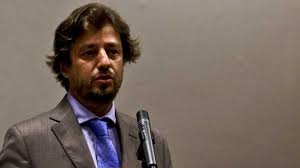By Andrew Warshaw
September 11 – Will this be the moment that exposes key ethical questions about Gianni Infantino’s conduct as FIFA president amid his claims that he is persuing meaningful reform?
Miguel Maduro (pictured), axed as head of FIFA’s governance committee last May during a purge of senior ethics watchdogs, appears before a British parliamentary committee on Tuesday to discuss his time at FIFA and the controversy surrounding his dismissal.
Maduro, a Portuguese lawyer and former government minister, part of whose job was to vet candidates for senior FIFA positions, was removed after less than a year in the role along with the heads of FIFA’s ethics investigatory and adjudication bodies.
Ironically, he had been hired by Infantino in the first place to be the public face of good governance and boost FIFA’s image in the wake of the global corruption crisis that brought the organisation to its knees.
No sooner had the highly regarded Maduro been removed than two more members of the governance committee resigned in protest: Navi Pillay, former United Nations High Commissioner for Human Rights, and corporate human rights expert Ron Popper.
Maduro, a former advocate general of the European Court of Justice, will be questioned by members of Britain’s Culture, Media and Sport select committee amid what is likely to be a heavy media presence.
He had been among a raft of leading independent experts replaced by FIFA’s Council in a major clearout that notably saw FIFA head ethics judge Hans-Joachim Eckert and lead prosecutor Cornel Borbely, whose joint work has brought down a raft of corrupt officials, also axed.
At the time of his removal, Maduro told The Associated Press: “The world of football still hasn’t realised what is required if they (FIFA) really want to act under the rule of law and in a manner that is subject to effective, independent scrutiny.”
He added it was a “dramatic and drastic decision” to push through such changes without “strong justification.”
Maduro’s departure is widely reported to have been linked to his role in blocking Russian World Cup supremo Vitaly Mutko from keeping his seat on FIFA’s ruling council. Mutko, a key Infantino ally, was barred because his role as Russia’s deputy prime minister was deemed to be in conflict with FIFA’s regulations on political neutrality.
Maduro appearing in public to talk freely about what it was actually like working inside FIFA could potentially be hugely compromising for Infantino and the FIFA hierarchy.
“I have always said that if I was asked to testify in front of a national parliament, then my obligation to cooperate would take precedence,” Maduro was quoted as saying by the New York Times.
Contact the writer of this story at moc.l1745272562labto1745272562ofdlr1745272562owedi1745272562sni@w1745272562ahsra1745272562w.wer1745272562dna1745272562

